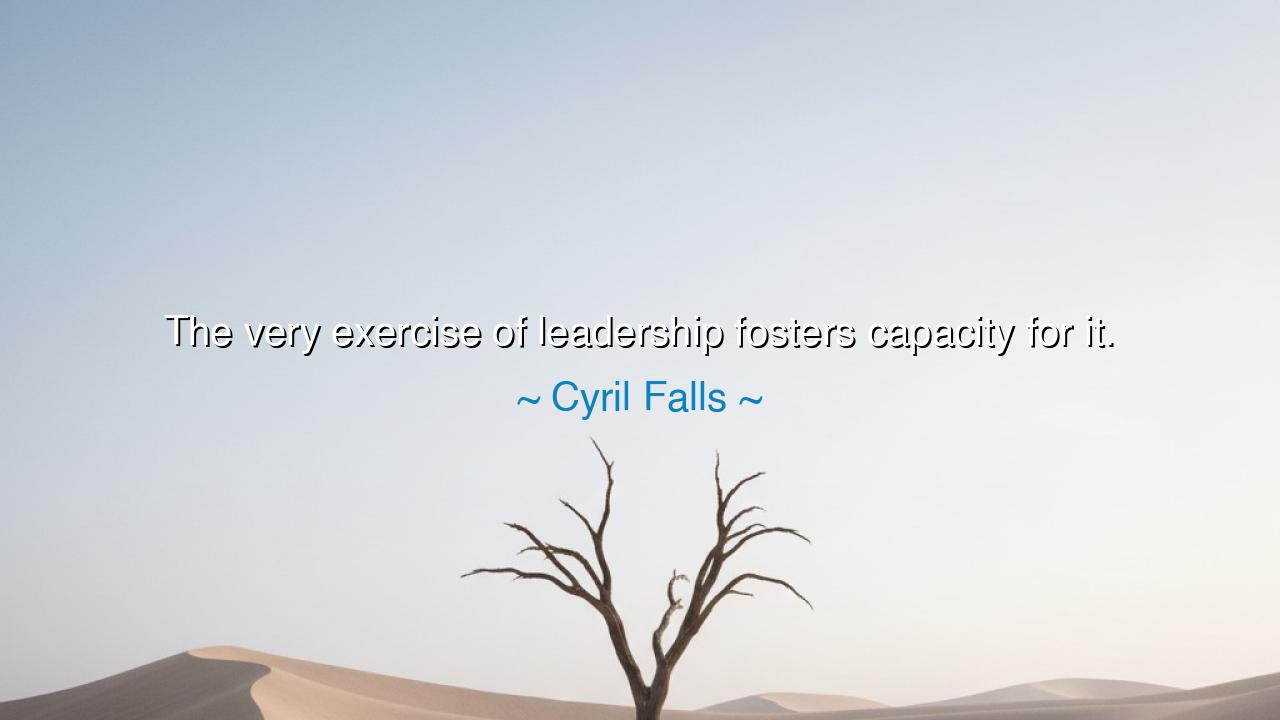
The very exercise of leadership fosters capacity for it.






“The very exercise of leadership fosters capacity for it.” So spoke Cyril Falls, a man who knew the weight of command and the fire of experience. His words echo through the corridors of time, reminding us that leadership is not born—it is forged. Like iron in the furnace, a leader’s strength is not granted by divine decree, but shaped through the very act of leading, through the struggle, the trial, and the test of the will.
In the beginning, one does not feel ready. The burden feels too heavy, the path too uncertain. Yet when a soul steps forward—when one dares to decide, to act, to guide others—the inner flame begins to burn brighter. The act itself becomes the teacher. For every command given, every failure endured, every doubt overcome, a new power awakens within. Thus the leader is sculpted not by comfort, but by motion; not by knowledge alone, but by the ceaseless effort to stand firm in the storm.
So it was with Alexander of Macedon, who at sixteen governed his father’s realm while Philip rode to war. Youth might have undone him, yet he did not shrink. He led men older than himself, disciplined armies, and learned the art of rule by ruling. By twenty, he was king; by thirty, master of an empire. His greatness was not sealed in prophecy—it was earned through the continual practice of command. The more he led, the greater his vision became. Each decision expanded his spirit’s reach, until even the vastness of the known world felt small before him.
This is the essence of Falls’s truth: leadership grows through use. It is a muscle, not a gift. The timid heart gains courage by speaking; the uncertain mind gains wisdom by deciding; the weary soul gains endurance by persevering. A leader who waits for perfect readiness shall wait forever, for readiness is born only in the doing. Just as the river shapes the valley through its own flow, so too does action carve the channels of greatness in the human spirit.
Yet let no one mistake this for ease. The path of leadership is a crucible. It demands humility as much as strength, compassion as much as command. To lead is to stand where arrows fall and still move forward. It is to bear responsibility for others, to learn from error without surrendering to despair. Through such trials, capacity expands. The heart that dares to bear weight grows vast enough to carry more.
In our own age, this lesson still burns bright. Consider the teacher who, though uncertain, steps before a class for the first time; the parent who guides a child with trembling care; the worker who takes initiative when none else will. Each act of courage enlarges the soul. The capacity to lead is not bestowed by birthright or title—it is awakened in those who rise when they might have stayed still.
Therefore, dear listener, embrace the exercise itself. Take the first step even when fear whispers “not yet.” Act, speak, guide, decide. Let every effort—successful or not—be a stone laid upon the foundation of your strength. In the furnace of action, you shall find your form; in the striving itself, you shall discover the leader within.
The lesson is clear: Do not wait for greatness to come before you act. Act—and greatness will come. In the rhythm of daily choices, in the courage to rise and lead, you will cultivate the very power that once seemed beyond reach. For truly, the very exercise of leadership fosters capacity for it.






AAdministratorAdministrator
Welcome, honored guests. Please leave a comment, we will respond soon